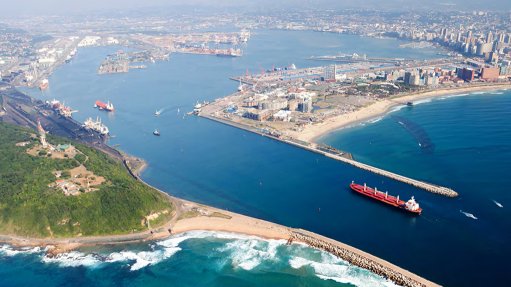G20 presidency must elevate AfCFTA


KESAOBAKA MOPIPI The AfCFTA can serve as a strategic hedge against global trade disruptions
South Africa’s current intergovernmental forum Group of 20 (G20) presidency is pivotal in elevating the African Continental Free Trade Area (AfCFTA) on the global agenda and setting the foundation for future engagement, says independent public policy think tank South African Institute of International Affairs (SAIIA) G20 researcher Kesaobaka Mopipi.
Highlighting the current state of trade in Africa, Mopipi explains that the continent continues to trade more with external markets than within itself. As a result, the continent is vulnerable to global supply chain disruptions and protectionist measures originating beyond Africa.
“We have not developed our value chains enough regionally to be able to offset some of the external shocks that come as a result of trading outside the continent,” she says.
The AfCFTA offers an opportunity to reduce this vulnerability by strengthening regional value chains and enhancing economic resilience. Therefore, accelerated implementation of the AfCFTA Agreement is vital for stabilising African economies and reducing their dependence on external markets, Mopipi asserts.
She highlights three key areas in which South Africa’s current G20 presidency can focus the G20 to make a meaningful contribution, namely infrastructure financing, the AfCFTA Adjustment Fund and policy coherence.
While governments remain the primary funders of infrastructure projects, they are constrained by high debt servicing costs and limited tax bases, which restrict fiscal space. Mopipi argues that this does not mean funding is unavailable.
Funding potential exists, particularly in the private sector. Therefore, governments should explore avenues to unlock and leverage these alternative financing sources. She also points to the potential of Africa’s mineral wealth, which can be harnessed for the continent’s benefit.
Through initiatives such as the G20’s Global Infrastructure Hub, the G20 can support infrastructure development by promoting best practices, improving project preparation and helping to mobilise private capital. She highlights the need to align existing initiatives, such as the G20 Compact with Africa, more closely with AfCFTA priorities, especially in promoting trade-enabling infrastructure.
Mopipi elaborates that aligning the Compact with Africa with AfCFTA priorities is the “most effective way” to leverage existing platforms. Further, with pan-African continental body African Union Commission now a permanent G20 member, she urges African States to advocate for stronger synergies between Compact-related investments and AfCFTA objectives.
“It would be more effective to see them create synergies with what has already been established, rather than trying to reinvent the wheel,” she says.
The AfCFTA Adjustment Fund, meanwhile, is intended to provide transitional support to African countries as they increase trade within the AfCFTA, including assistance in navigating revenue losses and structural shifts during implementation. G20 support in mobilising additional resources for this fund would ease the transition, Mopipi explains.
She adds that G20 policies must align with AfCFTA Agreement and Agenda 2063 objectives, avoiding contradictions or reversals. South Africa’s G20 focus areas — such as green industrialisation and critical mineral governance — should ideally receive consistent, long-term support beyond its presidency.
Aligned to this, she stresses the need for continuity in G20 engagement, ensuring that future presidencies build on South Africa’s objectives to sustain momentum on Africa’s integration agenda.
Mopipi also advocates for enhancing and adapting current initiatives to reflect Africa’s present-day priorities and concerns.
Building Resilience
Financing remains a critical area that deserves greater focus — not only for infrastructure but for the broader implementation of the AfCFTA, says Mopipi.
“The AfCFTA is a costly endeavour for everyone involved,” she says.
The reduction in official development assistance from countries such as the US and the UK puts further strain on African countries, she adds. African countries navigating AfCFTA Agreement implementation simultaneously contend with financial challenges, such as debt sustainability and limited fiscal space.
In response to these challenges, Mopipi calls for a comprehensive approach that strengthens the overall resilience of African economies, enabling them to implement transformative initiatives despite external and internal constraints.
Acknowledging the importance of ensuring that these obstacles do not overwhelm participating countries, Mopipi asserts that AfCFTA success largely depends on creativity and strategic thinking.
Mopipi notes that despite challenges, significant progress is being made and, through strategic plans and partnerships, the AfCFTA’s objectives are within reach.
She affirms that the AfCFTA can serve as a strategic hedge against global trade disruptions.
To achieve this, she emphasises the importance of value creation, noting that one of the key reasons African economies remain vulnerable is the nature of their trade with global markets, which primarily entails the export of raw commodities. This makes countries highly susceptible to commodity price volatility.
Mopipi therefore reiterates the need to develop regional value chains and prioritise value addition within the continent before engaging external markets. She also highlights accelerating regulatory harmonisation, investing in infrastructure to boost productive capacity and improving trade facilitation under the agreement.
Finally, she stresses the importance of strengthening institutional capacity within governments to ensure effective coordination under the AfCFTA. “This will promote greater self-reliance and enhance Africa’s competitiveness in the global economy,” she concludes.
Article Enquiry
Email Article
Save Article
Feedback
To advertise email advertising@creamermedia.co.za or click here
Comments
Announcements
What's On
Subscribe to improve your user experience...
Option 1 (equivalent of R125 a month):
Receive a weekly copy of Creamer Media's Engineering News & Mining Weekly magazine
(print copy for those in South Africa and e-magazine for those outside of South Africa)
Receive daily email newsletters
Access to full search results
Access archive of magazine back copies
Access to Projects in Progress
Access to ONE Research Report of your choice in PDF format
Option 2 (equivalent of R375 a month):
All benefits from Option 1
PLUS
Access to Creamer Media's Research Channel Africa for ALL Research Reports, in PDF format, on various industrial and mining sectors
including Electricity; Water; Energy Transition; Hydrogen; Roads, Rail and Ports; Coal; Gold; Platinum; Battery Metals; etc.
Already a subscriber?
Forgotten your password?
Receive weekly copy of Creamer Media's Engineering News & Mining Weekly magazine (print copy for those in South Africa and e-magazine for those outside of South Africa)
➕
Recieve daily email newsletters
➕
Access to full search results
➕
Access archive of magazine back copies
➕
Access to Projects in Progress
➕
Access to ONE Research Report of your choice in PDF format
RESEARCH CHANNEL AFRICA
R4500 (equivalent of R375 a month)
SUBSCRIBEAll benefits from Option 1
➕
Access to Creamer Media's Research Channel Africa for ALL Research Reports on various industrial and mining sectors, in PDF format, including on:
Electricity
➕
Water
➕
Energy Transition
➕
Hydrogen
➕
Roads, Rail and Ports
➕
Coal
➕
Gold
➕
Platinum
➕
Battery Metals
➕
etc.
Receive all benefits from Option 1 or Option 2 delivered to numerous people at your company
➕
Multiple User names and Passwords for simultaneous log-ins
➕
Intranet integration access to all in your organisation



















